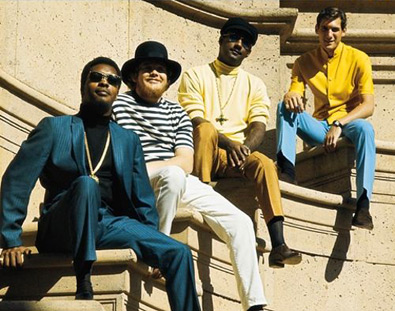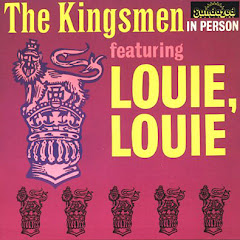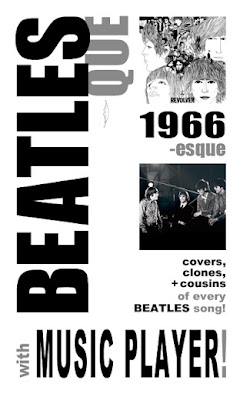Soul music is the shared emotion of experience. As such, everyone breathing can relate to it, be touched by it, be moved by it. Soul, like all great traditions, is actually what each person has brought to it and what we shared from it.
No one has a monopoly on pain. And the human heart is too huge to be bound by fake distinctions like class, body type, or skin. We breathe the same air, dream the same hopes, feel the same emotions. As souls, we share this life, and when we forget our commonality, music brings us back to the root; the interior truth of self.
From the beginning soul stew was cooked by everyone. It's initial gumbo ingredients were the sacrilegious mix of Gospel and Blues, but Jazz brass horns, voodoo mythos, Country tearjerkers, European strings, modern pop, Rock swagger, political Folk, and even spy themes have flavored it over time. It was male and female, and included label owners, talent scouts, songwriters, producers, and performers from every possible human persuasion.
Case in point. Until the late 1940's, all music made by African Americans was called "Race Music". Jerry Wexler, a writer for Billboard magazine's music sales charts, found this disgraceful. There had to be a more dignified term, but how do you encompass the various musics being made? Since urban Jump Jive and rural acoustic Blues were the most popular, he split the difference with the umbrella term, Rhythm & Blues. While R&B later became yet another flat euphemism for 'black music', it actually spoke to divergent sounds. As 1950 dawned, small independent record labels sprung up everywhere to sample the smorgasbord of homegrown talent nationwide. Jerry Wexler became perhaps the preeminent Soul music producer of all time working for Atlantic Records, owned by the astute and hyper-hip Ertegun brothers from Turkey: Ruth Brown, Ray Charles, the Coasters, Aretha Franklin, Otis Redding, the Rascals, and may more were his charges. Similarly, the Chess brothers parlayed the Chess label, the home of Muddy Waters, Howlin' Wolf, Chuck Berry, Bo Diddley, Etta James, etc. The jewish family had slept with a horse in their house back in Poland to keep warm in the winter. As hardluck musicians migrated from the depleted southern states to their Chicago studios, they found kindred sympathy.
In the South, Gospel music was God's music, and Blues was the Devil's by default. The line between the sacred and the profane was absolute. But the 50's was when the imaginary barriers started being challenged. Ray Charles, a cocksure upstart, committed heresy by combining the two. In 1955 he turned a hymn about love for Jesus into a secular ode to a girl with "This Little Girl of Mine". Churchfolk burned like brimstone over it, but young people felt the relief of constrictions evaporating. Ray had combined the sacred and profane and arrived closer to real life. He showed that any segregation is stillborn while synthesis is always rebirth. All too quickly, radio segregated everyone's psyches using separatist terms like 'Rock'n'Roll' for whites and 'Rhythm & Blues' for blacks. Most often this music was the same thing, just separated by the superficial. But at dancehalls all kids shook their hips the same, yelled the same, felt it the same. It made you move and it said something you understood inside.
Sam Cooke, Aretha Franklin, Johnny Taylor, the Womacks, and scores more also left the amen corner to sing new hymns from their hearts about the way they lived, and how they felt. By the early 60's, the R&B tag waned along with the doowoppers and the jivin'wailers. It was a new ere, with the Civil rights movement come to redeem America's heart and open up its future. It was the era of Soul music.
the Funk Brothers.
It came from everywhere and back. Motown records in metal Detroit. Chess in hogkiller Chicago. Atlantic in nosebleed New York. Stax in funky Memphis. And from one-hit and no-hit wonders on meteoric labels throughout the south and west and north, and soon from as far east as the United Kingdom. It was tender or tortured ballads, uptempo dance stompers, crazed gobbledygook, strutting proud testimonials, and anthems for justice. It consoled your pain, conjured your joy. Berry Gordy called his label "The Sound of Young America" to transcend useless terms like black and white, but that was only the beginning. Soul music had tapped into the declarative, confessional nature at the heart of all the world's folk musics. Its passionate vocals were a shared memory in all cultures. As such, it was felt, resung, and rebounded back. It was a universal chord that resonates through all pop history since. The British Invasion couldn't win without it, and its influence fused with Jazz, metronomed beneath Psychedelia, got all Funked up, hothoused Ska and Reggae, boogied Glam, strobed Disco, swelled under New Wave, spliced Rap, throbbed in the abstract through House and Jungle, inverted itself as Neo-Soul...well, you feel me.
Every great label had a house band cooking up all the hits. Stax made Memphis soul stew with Booker T and the MG's. Rock steady drums, pulsing melodic bass, slinky azz organ, and zen essence chank guitar. Bring in the class brass of the Memphis Horns, a killer tune, and a belting singer and then look the hell out! Besides their own proto-funk instrumental classics, like "Glass Onion" and "Hip Hug Her", they backed Otis Redding, Wilson Pickett, Sam & Dave, Rufus and Carla Thomas, Albert King, and more. Like their rivals at the Muscle Shoals studios, they were soul brothers one and all, and the fact that they were varied hues only added more flavors to the brew.
Soul music is the soundtrack of the human experience. It's cheap and easy to wear attitude like armor. But it takes real courage to bare your heart to the world. To confess doubt, hurt, or wrestle with anger or anguish. To drop the skin and disclose the interior truth of self. That kind of vulnerability is the core of real growth, toward maturity, solace, wisdom. Listen to these brave songs, where men and women stand vulnerable before the eyes of the world. Listen in recognition as they unveil our common heart.
© Tym Stevens
See Also:
• "Time Is Tight!" - Booker T > The Clash > Elvis Costello > Squeeze
• "Take Me To the River" - Al Green > Bryan Ferry > Talking Heads
• "Tainted Love" - Gloria Jones > Soft Cell
• LADIES FIRST: "What A Man" - Linda Lyndell > Laura Lee> Salt-N-Pepa
• LADIES FIRST: "You're No Good" - Dee Dee Warwick > Betty Everett > Linda Ronstadt > The Plasticines
• The Real History of Rock and Soul!: A Music Player Checklist



































































































































2 comments:
Thak you...and thank you again! This part at the end: "To confess doubt, hurt, or wrestle with anger or anguish. To drop the skin and disclose the interior truth of self.
–msde me tear-up.
I feel much better now =)
Nice post-- There really isn't anything like great Soul, is there?
Post a Comment